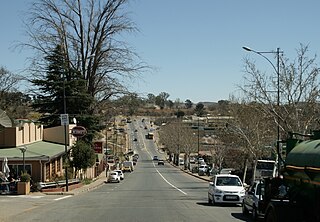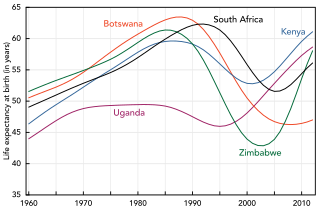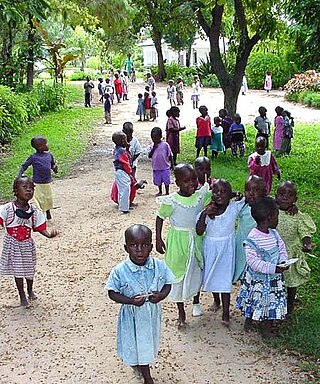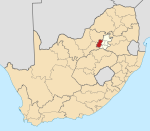
HIV/AIDS originated in the early 20th century and remains a significant public health challenge, particularly in Africa. Although the continent constitutes about 17% of the world's population, it bears a disproportionate burden of the epidemic. As of 2023, around 25.6 million people in sub-Saharan Africa were living with HIV, accounting for over two-thirds of the global total. The majority of new infections and AIDS-related deaths occur in Eastern and Southern Africa, which house approximately 55% of the global HIV-positive population.

An orphanage is a residential institution, total institution or group home, devoted to the care of orphans and children who, for various reasons, cannot be cared for by their biological families. The parents may be deceased, absent, or abusive. There may be substance abuse or mental illness in the biological home, or the parent may simply be unwilling to care for the child. The legal responsibility for the support of abandoned children differs from country to country, and within countries. Government-run orphanages have been phased out in most developed countries during the latter half of the 20th century but continue to operate in many other regions internationally. It is now generally accepted that orphanages are detrimental to the emotional wellbeing of children, and government support goes instead towards supporting the family unit.

Mamelodi is a township northeast of Pretoria, Gauteng, South Africa. A part of the City of Tshwane Metropolitan Municipality, it was set up by the then apartheid government in 1953.

Magaliesburg is a small town situated below the Witwatersrand mountain range in Gauteng, South Africa. The Magaliesberg mountain range is north and visible from town, hence the name "Magaliesburg". The mountains themselves are named after Kgosi Môgale Wa Môgale, a MoTswana chief of the BaPô ba Mogale clan. Burg is the Afrikaans name for Town and berg means mountain.

Nkosi's Haven is an NGO in the Johannesburg, South Africa area that offers residential, holistic care and support for mothers and their children whose lives have been impacted by HIV/AIDS. Nkosi's Haven also provides support for orphans, HIV/AIDS affected or not. It aims to improve the productivity of their residents through providing access to medical care, therapy, education and skill building workshops. The goal is to empower residents while providing a safe, dignified home in hopes that all mothers and children are able to become responsible and contributing members of society.
Camp Sizanani was founded as a joint venture between Global Camps Africa, a non-profit headquartered in Reston, Virginia, and HIVSA, a South African foundation that provides care and services to HIV-affected individuals. Operating in the Magaliesburg area in North West Province, South Africa, Camp Sizanani offers multiple camp sessions throughout the year for children aged twelve through nineteen whose lives have been affected by HIV/AIDS. The term HIV-affected can imply that an individual is infected with the virus, but it can also mean that the infection of family members or guardians have impacted the individual's life. While some children at Camp Sizanani are HIV+, many more have been orphaned by a parent's AIDS-related death or have family members coping with the disease. Nearly all of Sizanani's campers come from Soweto, Johannesburg's enormous township, to which many black Africans were relegated during South Africa's apartheid era. The children attend the camp free of charge; they are sponsored by Global Camps Africa and its donors.

HIV/AIDS in India is an epidemic. The National AIDS Control Organisation (NACO) estimated that 3.14 million people lived with HIV/AIDS in India in 2023. Despite being home to the world's third-largest population of persons with HIV/AIDS, the AIDS prevalence rate in India is lower than that of many other countries. In 2016, India's AIDS prevalence rate stood at approximately 0.30%—the 80th highest in the world. Treatment of HIV/AIDS is via a combination of antiretroviral drugs and education programs to help people avoid infection.

Keep a Child Alive (KCA) is a nonprofit organization that provides healthcare, housing, and other support services to HIV/AIDS-affected communities in Africa and India. Co-founded by Leigh Blake and Alicia Keys, the organization aims to "realize the end of AIDS for children and families, by combating the physical, social and economic impacts of HIV." Keep a Child Alive organizes the annual fundraiser gala The Black Ball, established in 2004, where celebrities and philanthropists gather to support and raise awareness for the cause. Since the first Black Ball, the organization has raised over $28.7 million for HIV/AIDS treatment.
Community-based care serves as a "bridge" between orphanage and settlement house. Adolescents are placed in a family in their community. The guardians will provide individual care and nurture in the context of a family and community. This teaches adolescents more independence.

Eswatini–United States relations are bilateral relations between Eswatini and the United States.

HIV/AIDS affects economic growth by reducing the availability of human capital. Without proper prevention, nutrition, health care and medicine that is available in developing countries, large numbers of people are developing AIDS.

As of 2012, approximately 1,100,000 people in Malawi are HIV-positive, which represents 10.8% of the country's population. Because the Malawian government was initially slow to respond to the epidemic under the leadership of Hastings Banda (1966–1994), the prevalence of HIV/AIDS increased drastically between 1985, when the disease was first identified in Malawi, and 1993, when HIV prevalence rates were estimated to be as high as 30% among pregnant women. The Malawian food crisis in 2002 resulted, at least in part, from a loss of agricultural productivity due to the prevalence of HIV/AIDS. Various degrees of government involvement under the leadership of Bakili Muluzi (1994–2004) and Bingu wa Mutharika (2004–2012) resulted in a gradual decline in HIV prevalence, and, in 2003, many people living in Malawi gained access to antiretroviral therapy. Condoms have become more widely available to the public through non-governmental organizations, and more Malawians are taking advantage of HIV testing services.
Consol Homes is a Malawi community organisation that supports orphans and young children affected by HIV and AIDs.

An AIDS orphan is a child who became an orphan because one or both parents died from AIDS.
Starfish Greathearts Foundation is an international non-governmental organisation formed in 2001 to help orphaned and vulnerable children in South Africa. Its mission is to help make a difference in the lives of such children via community-based projects working at grassroots level. This enables individual communities to develop their own solutions to fight the challenges they come across. As of January 2022, Starfish projects have reached more than 220,000 children in 110 communities across South Africa.</ref> Starfish Greathearts Foundation.
South African National Railway And Steam Museum (SANRASM) was meant to be the national railway museum authority of South Africa, by the original initiative of the RailRoad Association of South Africa (RRA) and then transport authority South African Railways and Harbours. SANRASM has three sites around the Krugersdorp and Randfontein area.

Lesotho–South Africa relations refers to the current and historical bilateral relations of South Africa and Lesotho. Lesotho, which is surrounded by South Africa, depends on South Africa for most of its economic affairs, and its foreign policy is often aligned with that of Pretoria. Both are member states of the Commonwealth of Nations, African Union, Southern African Customs Union and Southern African Development Community. Lesotho, along with Eswatini, have been described as satellite states of South Africa.

Intsika Yethu Municipality is a local municipality within the Chris Hani District Municipality, in the Eastern Cape province of South Africa. The municipality is one of the six local municipality in this district. Intsika Yethu is an isiXhosa word meaning "our pillars".

South Africa's HIV/AIDS epidemic, which is among the most severe in the world, is concentrated in its townships, where many black South Africans live due to the lingering effects of the Group Areas Act.

Ringo Madlingozi is a South African singer, songwriter, record producer and a former member of the National Assembly of South Africa. Madlingozi rose to fame when he and his band Peto won the Shell Road to Fame contest in 1986. He later formed a group called Gecko Moon with Alan Cameron, a fellow Peto member.

















